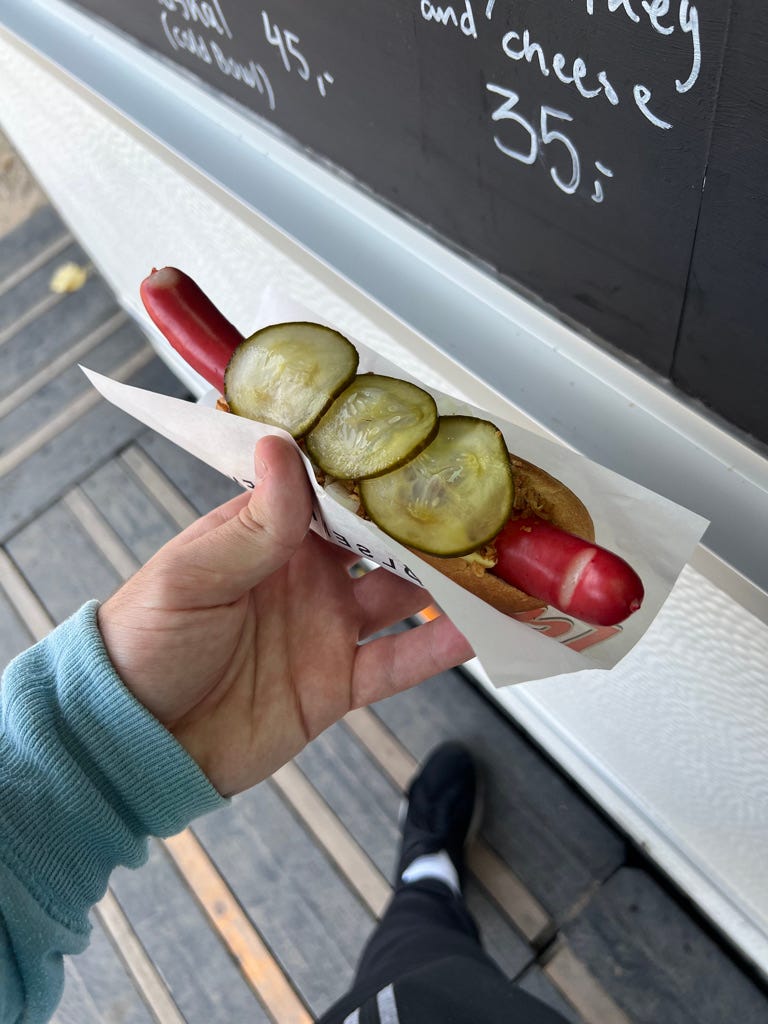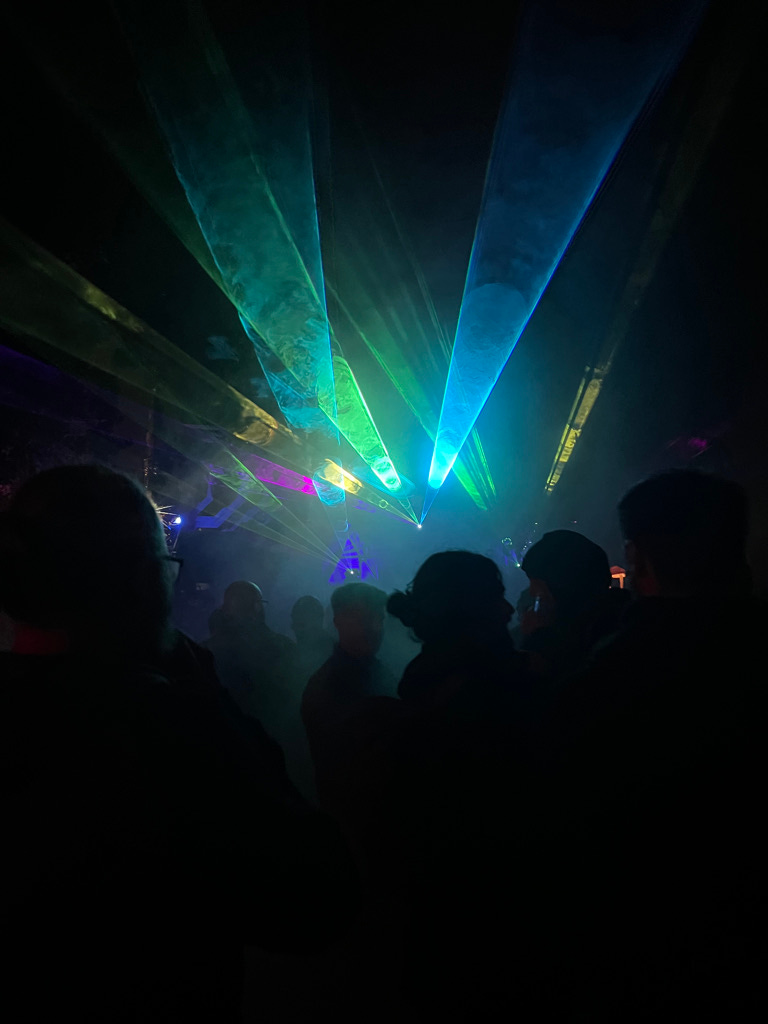Freedom and where not to find it
Inside Freetown Christiania, Scandinavia's anarchist microstate
During our stretch in Berlin, Graham and I visited Copenhagen. My brother insisted we check out the anarchist microstate and commune of Freetown Christiania. The trip was deeply informative about the nature of freedom, what it means to different people, and how elusive it can be.
In 1971, Danish soldiers vacated a military base in the heart of Copenhagen. As soon as the military moved out, squatters moved in. 51 years later, Freetown Christiania persists as a stalwart bastion of chaos in an otherwise orderly city. The settlement exists in a precarious legal niche of quasi-anarchy, and, as the name implies, has had a mandate of freedom since its foundation.
As someone with a bent for liberty, I was intrigued. I wasn’t sure whether to expect CHAZ, a kibbutz, or an overhyped tourist trap.
We arrived by taxi — Uber pulled out of Denmark after they passed a law requiring video surveillance of cabs — but it could only take us to the edge of the city. Beyond just Ubers, all cars are banned in Christiania.
The first thing you notice is the art that greets you as you enter the settlement. The old, utilitarian buildings served as the canvas for a wide array of colourful-for-the-sake-of-it paintings depicting nothing in particular, reminiscent of a hippie-van aesthetic. It feels like a rushed first-order approximation of art. It was shallow and incoherent, attesting in its sloppy urgency that perhaps the rain washed it away every night and it was painted anew in the morning.
This stood in sharp contrast to the lucid Nordic architecture elsewhere in Copenhagen. Even the birds flying overhead could spot Christiania, an enclave overtaken by greenery smack dab in a city of cogent development.
We continued onwards, and we entered a square filled with street vendors. One artist in particular caught our eye, selling fractal paintings adorned with UV features.
Though his paintings were what drew us to him, it was the grid of hand-drawn buttons pinned to a cork board that cemented him in my memory. Among them was a “Fuck Putin”, right beside a “Fuck the EU”. Intrigued by the two views that I found intangibly at odds, I asked him about his gripes with the EU.
He responded that the EU destroys all the diverse national cultures within and supplants them with an artificial European culture. Freedom to him was an escape from continental politics and prescribed culture.
Seconds after walking away, we heard him screaming at some tourists for taking pictures of his art without his permission. Freedom to him also included a concept of intellectual property, apparently.
I heard a different street vendor speaking Portuguese, and went over to hear his story. As a young man from Brazil, he began to travel northward to the US seeking better economic prospects. Right as he was preparing to jump the US–Mexico border, he was offered the opportunity to go to Denmark instead (I’m still unsure how that came about). He took the trip and, as an illegal immigrant in Denmark, found himself settling in Christiania.
He viewed the country as a paradise, full of wealthy people and a high-trust society. He sold goods from a cart, and said that when he first arrived 30 years ago, he could leave all his wares for a few hours and everything would be right as he left it when he returned. Nowadays, it would all be stolen within five minutes.
His theory for the cause of this social decline? Illegal immigrants. He said that greedy migrants flocked to Denmark and now represented a significant portion of the population, ruining society for the rest of the country. To him, freedom didn’t make sense if there were no safeguards to protect it from opportunistic outsiders.
The irony was lost on him.
We then went to investigate what Christiania was most famous for: semi-legal cannabis. We entered a sketchy but down-to-earth dispensary and had a nice conversation with the budtender. The experience was like Limewire in 2022 — something that was once the best way to skirt the law and fly by night, but now mostly exists as a museum. The same way there are now far better apps for free music, I would far rather purchase something from a highly-polished Cloud Cannabis storefront in Michigan than the seedy shop I was in.
Next, we found a bar offering a Christiania-themed hemp beer (though it was disappointingly brewed in Poland and shipped in). We discovered that it was Christiania’s 51st anniversary that day and there was to be a big party that night. We each bought a bottle and carried onwards.
Searching for a spot to drink our beers, we sat beside an older man lost in thought. After exchanging pleasantries, we asked if he frequented Christiania. He replied by giving us a broad grin with one of his front teeth prominently absent. He told us he used to live here, and pointed to the void in his smile as proof: he’d lost his tooth in a drunken brawl about ten feet from where we were sitting.
He explained that he had come to Christiania for a chance to live cheaply in the newly vacant buildings, to enjoy life, and to be free. Everything had quickly soured, as the strongest and most aggressive men banded together and evicted all the weaker residents from the nicest buildings. He told us that freedom meant nothing without protection for the weak, otherwise they would simply be dominated by those with power.
He also offered further insight into his perception of freedom. After moving to Christiania, he’d become deeply alcoholic and dependent on the supply of cheap, unregulated drinks. He was enslaved by his addiction and felt trapped in a cycle of misery. That is, until he took charge of his life and founded the Christiania chapter of Alcoholics Anonymous. It felt surreal to have this conversation while drinking our Christiania beer.
He continued on to say that to him, sobriety was freedom. Not being under the boot of alcohol allowed him to finally start living life, leaning heavily on the Danish social security system to reestablish a life outside of Christiania. That day was his first time back in Christiania in almost 20 years, returning to reminisce on its anniversary.
After our beers, we continued on to a hot dog stand manned by a woman. She was born in Christiania and now had a child of her own, but has since moved out and commutes to the city for work. This was an unexpectedly common arrangement among the people we spoke to. We asked her why she’d left, and she said she sought to keep her son out of the prevalent gangster life he was attracted to in Christiania. But, since this is the only world she knows, she still returns for work. We were astonished to learn that her son is just 12 years old. Freedom to her meant being able to live untempted by crime and violence, especially as a child.
We ate our hot dogs and then rested our legs for a while in a seating area that was marked restricted, except to the patrons of the nearby restaurant (which we were not). We left Christiania just as they were making preparations for that night’s anniversary party.
Later that night, we were in a bar chatting with a young woman. She told us that before she was able to party in Copenhagen’s clubs and bars, she was partying in Christiania. To her, freedom was the right to party. After that, we couldn’t help but return to check out the 51st anniversary party, which had a spectacular laser show.
After a long and insightful day, I reflected on the diverse perceptions and incarnations of freedom. Freedom comprised many aspects that I had taken for granted, like sobriety and safety, and others that I hadn’t considered a part of freedom at all, like protections for the weak and preservation of local culture.
Most of the aspects of freedom espoused in Christiania are freedom from, as in freedom from taxation. The part of freedom that felt neglected in my conversations is freedom to, as in freedom to travel unharassed. I suspect that the spontaneous and anarchist nature of Christiania lends itself more to freedom from, in contrast to the intentionally designed American system that accommodates freedom to.
My own definition of freedom is being able to pursue the endeavours that you find meaningful — free to fulfill purpose. This complex freedom arises when you are unbound by legally prescribed career paths, have no onerous government regulations in your way, and are physically safe, while also having sufficient infrastructure, funding, like-minded peers, support systems to take risks, and the opportunity to discover what work proves meaningful.
Though Christiania fulfilled some of these criteria, including a couple that the rest of Denmark may not, the ultimate freedom is absent — few of the residents we encountered seemed fulfilled in what they were doing. Visiting the city made me realise how fortunate I am to live free, endowing me with a newfound gratitude that I carry each day.
Thanks to
for inspiring me to write this a few months ago, which I now find a fitting intro to this account. Thanks to for help editing.




I am surprised that you did not comment on what, to me, is by far the most mind-bending feature of Christiania, which is its unique (as far as I am aware) approach to building, frequently described as "architecture without architects." Perhaps you opted to stay near the entrance, where most of the large buildings are? If so, I would highly recommend a second trip, focusing on the path around the canal, which will introduce you to some of the most most visually arresting homes you've ever seen in your life. What's most surprising is that there are not one or two examples of interesting homes, but dozens, at least. To the people who live in these properties, freedom means the freedom to construct and decorate their own dwellings according to their own aesthetic desires, free from the interference of restrictive building codes and planning requirements. It's genuinely striking how creative and individualized artistically talented people can make their own homes, when they are allowed (and culturally encouraged) to do so. It's hard to come back to the regular city and not feel that the dwellings we're used to living in are drab, boring, colorless in comparison.
Re the vendor who didn't want his goods photographed: 15 years ago the policy was no photographs anywhere in Christiania, not just photographing someone's goods. I assumed it was to do with making it harder to prosecute people for selling weed.